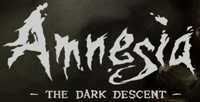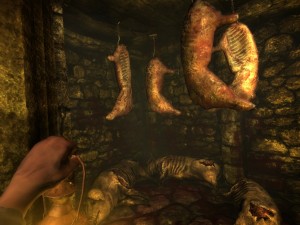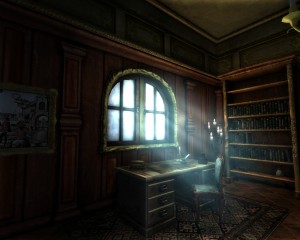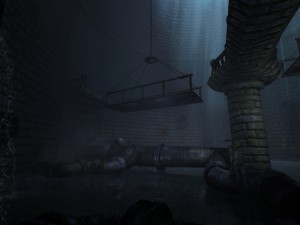Amnesia: The Dark Descent Impressions (PC)
- Updated: 11th Nov, 2010
Introducing another new contributor to The Average Gamer, Jon Jones. Jon was born in London and grew up in California. A lover of games and storytelling in general, he considers himself a bit of a “Renaissance Geek” with interests in traditional table-top role-playing and board games. His gamer DNA stretches back the golden age of 8-bit, where he found himself enraptured with the Ultima series on the Commodore-64. Jon became primarily a PC gamer, but has since moved with the trends back to consoles, mobile and more casual gaming.
 Amnesia blends all of the right elements for me, and although it could be distilled down to a “hiding in the cupboards game”, as some of my friends describe it; so far I’m finding it a unique and gripping experience. Walking around the environment, I can’t escape the feeling that Amnesia is like a modern day Myst. You are acting out an adventure story in first person, and using the mouse much like your hand, manipulating and interacting with the environment. There are puzzles to solve which help you slowly unravel the clues that describe how you got into this mess and how you’re trying to get out of it. In many ways, it also reminds me of the rather under-appreciated Call of Cthulhu: Dark Corners of the Earth; primarily in its use of madness, first person exploration and dark themes.
Amnesia blends all of the right elements for me, and although it could be distilled down to a “hiding in the cupboards game”, as some of my friends describe it; so far I’m finding it a unique and gripping experience. Walking around the environment, I can’t escape the feeling that Amnesia is like a modern day Myst. You are acting out an adventure story in first person, and using the mouse much like your hand, manipulating and interacting with the environment. There are puzzles to solve which help you slowly unravel the clues that describe how you got into this mess and how you’re trying to get out of it. In many ways, it also reminds me of the rather under-appreciated Call of Cthulhu: Dark Corners of the Earth; primarily in its use of madness, first person exploration and dark themes.
The atmosphere is positively dripping with Howard Phillips Lovecraft. Picking up and reading the disparate pages scattered about the hoary old castle to piece together the back-story feels like something right out of one of the great man’s short stories. Normally, I find the old trope of the player’s character having amnesia to be a trite and lazy explanation (or lack thereof), but from what I’ve experienced so far, it seems to have been deeply woven into the fabric of the story. While you are retracing events that the main character Daniel has painstakingly (and intentionally?) tried to erase from his mind, you are also getting pieces of what happened before, and what brought him to this evil place in the middle of a foreboding Prussian forest. I won’t spoil the mystery, but the pages of the journal speak of strange excavations in the desert, weird artifacts and alien vistas, which does more to evoke the feeling of playing a horror novel than in other games which have employed similar techniques.
Amnesia establishes early that Daniel is at the heart of the mystery and although I haven’t finished the game, I have an inkling that there could be more twists and turns before the story is done. Some of the scares veer a bit too close to the cheesy “monster closet” variety, but the profoundly creepy environment is nearly enough to keep any gamer worth his or her salt moving forward to uncover the narrative. Yes, you do hide in cupboards and darkened rooms. But that’s the genius of the game design, really. You have to balance staying hidden in the dark, which slowly drives you mad, with lighting up every sconce and lantern you can find, making the player a walking target to the game’s enemies… Enemies for which you have absolutely no defence and have no choice but to hide from.
I don’t want to say too much about them, but in my first playthrough of the demo, I couldn’t help be curious to see one of the things up close. The game builds the tension nicely, with half-heard sounds and the suggestion of movement just outside one’s vision. Eventually you do chance upon one of the castle’s denizens, to which I promptly decided to examine up close. The fiend disappeared in a cloud of mist and I felt the barest disappointment: that perhaps the entire game was simply about playing tricks upon the player. As Lovecraft and Hitchcock have both demonstrated, oftentimes it’s the things that you don’t see that are the most terrifying.
After purchasing the full game, and finding myself in the same section of the castle, I once again sprinted up to try and see this shambling figure first-hand. I nearly jumped out of my seat when it turned its hideous head, let out a surprised groan and started advancing upon me! The music rose to a crescendo of panicked notes and I instinctively turned and ran, knowing that the creature had seen me and was chasing after me. It was like a gruesome parody of a Metal Gear Solid sequence. I doused my light and ran blindly, desperately trying to find a closet or cupboard to hide within. I think most gamers should know that feeling; when the AI enemies are chasing after you and you can’t really turn to look without slowing down– but by all rights you know they are probably right behind you…
The moment was brilliant and happily dashed all of my preconceived expectations about the whole game just being about teasing the player. Most importantly, I knew the danger was genuine: these horrid, shambling things were not just figments of Daniel’s imagination and they clearly wanted to do violence upon him.
So every now and again while playing Daniel, you do hide in cupboards, and the physics-based interface allows you to open the door just a crack to see if that lurking horror is still there. The game warns you not to stare at them for too long, or witness too many unsettling events, or to cower in darkness for overlong lest you be driven suddenly, irrevocably mad.
If you can’t already tell, I am caught up in the game’s enchanting embrace and have very little negative to say about my experience so far. Some of the voice acting is a bit middling but on the whole it works well enough to keep the immersion in the story. I can’t really call it a criticism but as a veteran of many first person shooters, the temptation to try and pick up some kind of weapon (small hammers, rocks, chairs, etc.) to defend oneself is there but can’t be appropriately satisfied. The puzzles may be too easy for some, but I’m finding them to be just the right amount of challenge to slow my progress and, although they are obviously contrived, the experience doesn’t suffer much for it.
Much like PlayDead’s Limbo, each area is generally self-contained, with a clear course of direction and the amount of backtracking is minimal. The aforementioned “monster closets” can be a bit annoying, and there does appear to be somewhat of a formula of “pick up the important item” followed by “run and hide from the spawned beastie which has just conveniently announced itself”, but generally the game doesn’t always employ these in the way one expects and so far hasn’t detracted too much from what has been a superlative and gripping experience.
For fans of horror, or even those who just want a change from the usual FPS shoot’em ups would do well to check out the Amnesia: The Dark Descent demo on Steam.





Follow Us!